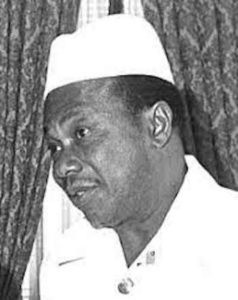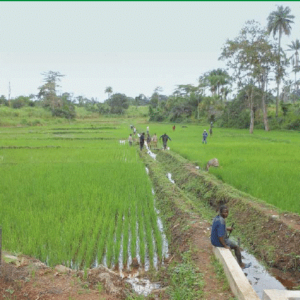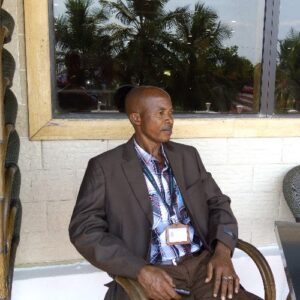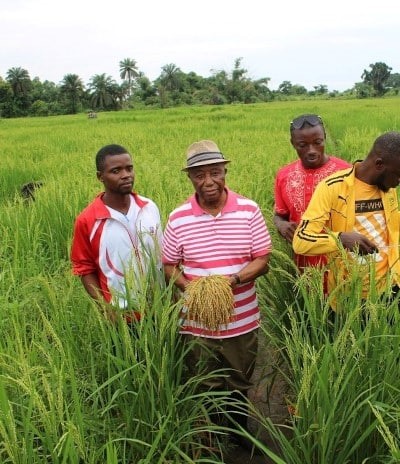By Hun-Bu Tulay
Email: ntevoma@gmail.com/ Cell #: +231777111032/886517356
“If I have seen further, it is by standing on the shoulders of giants.”
Sir Isaac Newton
The above quote is from a letter written by one of the greatest physicists and mathematicians (Sir Isaac Newton) to his senior brother and Physicist Sir Robert Hook in 1675. In this quote, Newton wasn’t literally standing on the shoulders of giants. He was simply explaining that his ideas did not come from him alone. He relied on the ideas and works of those who came before him. He read their ideas and works and modified them or improved on them to arrive at most of his works and ideas. Newton was a very excellent reader and that is the reason he achieved more than many scientists before him.
In part one of the Feature “From Pages of Liberia Histories”, we wrote that Great Leaders are those you read and understand the works of past leaders because it helps them to understand the challenges they faced and how they overcame those challenges as well as their failures and the reasons for the failures.
President Boakai can become the greatest President of Liberia because if he studies the works of the twenty-five Presidents before him; he is in a better position to solve most of the country’s problems which are not new. Most of the country’s problems are not new. These problems include (land dispute, corruption, food insecurity, messy educational system, poor healthcare, bad roads, nepotism, injustices, police brutality, random killing and the list goes on). These social anomalies problems have repeated themselves over the past 178 years and some of our leaders and others did not handle these problems well and others did not. The poor handling of some of these recurrent problems resulted in violence and destruction of lives and properties worth millions of United States Dollars.
We cannot continue this path; the President and his Cabinet Ministers, heads of autonomous agencies, members of the Judiciary, and Legislators should seriously take note of Newton’s quote and not SQUANDER the opportunity to transform the country for the better. They need to focus on the simple things that can benefit all Liberians irrespective of their status in the society. The President’s agenda (ARREST) contains these simple things (Agriculture-Food security, Roads, Rule of Law, Education, Sanitation, and Tourism). Investing in these simple things will create more than 10,000 new jobs for the youth of the country. If these simple things are not addressed in the next 180 days of President Boakai’s leadership, we might be heading in the wrong direction. The next 180 days is a critical period for this country. At the end of the next 180 days which started June 1, 2024, we will know if the RESCUE MISSION will SUCCEED or FAIL. The lives of millions of downtrodden Liberians hang in A BALANCE WAITING FOR RECUSE. Mr. President, YOU CAN NOT/SHOULD NOT DISAPPOINT THEM. Even if only 25% of the ARREST AGENDA is achieved in the next 180 days, that could be a good sign for hope for a better Liberia in the days ahead.
Like Newton, we have been reading the works of past leaders. We believe that even though President Boakai and some of his cabinet members served in high positions for some of these past leaders, particularly successful leaders, their MEMORIES need to be refreshed.

We will discuss the ARREST AGENDA and CORRUPTION. We will take each letter and what it stands for in ARREST AGENDA and discuss it and indicate what past Presidents did.
- A-Agriculture, 2. R – Road, 3. R-Rule of Law, 4. E -Education, 5. S – Sanitation, and 6. T-Tourism and we will further add and discuss CORRUPTION.
- Agriculture – Rice production: First, we would like to comment on the President’s Rice Policy Committee just appointed. Mr. President, do you think that we need a Rice Policy Committee? We believe that we do not need the Committee because we have written many strategies and issued many proclamations on Rice Production in Liberia. We would like to list a few as follows: (Tolbert’s Self-Sufficient Proclamation, The Green Revolution of Doe of 1986, Food and Agriculture Strategy of 1981, Madam Sirleaf’s -2012 National Rice Development Strategy of Liberia (Doubling Rice Production by 2018), and Madam Sirleaf’s Agriculture Blue Book of Liberia 2007). Funding any one of these strategies/innovations thrusts could make the country Self-Sufficient in Rice Production within three years.
Now, reference the Rice Policy Committee, Mr. President, we are little concerned because some of those on the Committee are the people who created the problems. Secondly, reviewing the membership, we do not see an Agriculture Scientists on the Committee, Mr. President. Are there no such people in Liberia now- a- days or is there any reason they were not included on the Rice Policy Committee? No sound policy on rice can be developed without the input of rice specialists.

Thirdly, Mr. President we suggest that no Cabinet Ministers should be on the Committee since the document will be sent to the Cabinet for review and vetting or endorsement.
Fourthly, the Committee membership of seventeen is too large. Such a policy Committee could function better and more efficiently with only five or seven members.
We would like to suggest some names to you for this Committee, some. Some of whom you know very well.
- Dr. J. Qwelibo Subah holds a PhD in Soil Science, and he is former head of CARI and he worked as Agriculture Specialist at the headquarters of the Economic Community of African States (ECOWAS) in Abuja, Nigeria for many years. He has written many papers on Rice Production in Africa.
- Dr. Sizi Z. Subah holds a PhD in Agronomy-PLANT BREEDING, and he served as a Senior Scientist at the Central Agricultural Research Institute (CARI) in Suakoko for many years and later became Deputy Minister for Technical Services at the Ministry of Agriculture; and he is currently engaged in agricultural consultancy and related advisory services.
- Dr. Roland Massaquoi, who holds a PhD in Agronomy-PLANT BREEDING and he once served as Deputy Director at CARI and former Minister of Agriculture.

- Dr. Moses Zinnah holds a PhD in Agricultural Extension, and he is former Dean of the College of Agriculture and Forestry at the University of Liberia, former Minister of Agriculture of Liberia and former Vice President for Academic Affairs at the University of Liberia.
- Dr. Zinnah is a scholar and has written many peer-reviewed papers on agriculture and served as a former Professor at University of Cape Coast in Ghana and Ahmadu Bello University in Nigeria.
- Mr. Jobson Momo holds a master’s degree in agriculture from Jomo Kenyatta University in Nairobi. His Thesis was on “Climate Change Effect on Quality Seeds and Grains Production in Africa”. His thesis was widely published in many Agriculture Journals around Africa. The University has offered him a scholarship to do his PhD. He is presently collecting data for his PhD Thesis “Seed Management System in Liberia”. Mr. Momo is a Rice Specialist.
Mr. President, all the above-named persons are Liberians, and they are available in the country. Members of such a Rice Policy Committee members should be the crème de la crème tops of the creams of Liberians. There are many other Agriculture Scientists in the country beside the above-named Liberians.
Now, coming back to Agriculture (RICE PRODUCTION). Liberia has a huge agriculture potential. The country has 41% (4.6 million hectares) of ARABLE LAND. Of these 4.6 million hectares of arable land, 0.6 million hectares are lowland land or irrigable land and four million is upland. The country’s drive for self-sufficiency in its STAPLE FOOD (RICE) dates as far back as 1929 when agriculture was introduced at Booker Washington Institute (BWI). The government in 1951 established the Central Agricultural Experimental Station (CAES) in Suakoko, Bong County; it was later upgraded and renamed the Central Agricultural Research Institute (CARI) in 1980. Agriculture Education was introduced in all other High Schools in the country in the 1960. Both Junior and Senior high schools had Four H-Clubs. Similarly, the College of Agriculture and Forestry at the University of Liberia was established in the 1960s. These developments were followed with the government establishment of the Department of Agriculture on May 11, 1964. With all these efforts, rice production was low, and the country was importing 80% of the staple food until the Tolbert presidency.
The Tolbert’s Administration realized that one of the impediments for the local rice farmers was ACCESS to Financing for large scale Rice Farming. In addition, there was the need for machines to clear the land as well as the lack of government incentives for rice farmers. Tolbert established AGRIMECO (Agriculture Mechanization Company) in 1972. AGRIMECO was a unit in the Ministry of Agriculture. This entity The AGRIMECO spearheaded land clearance for farmer cooperatives and provided training for the local farmers. Tolbert introduced the Annual Agriculture Fair. The fair was rotated annually from county to county and the farmer who produced the largest rice was awarded the amount of US$10,000.00. In Tolbert’s Annual Message of 1974, he informed the Legislators, Liberians and the world that the country had reduced rice importation by 38%. The company developed rice farms in Foya District, Lofa County. It later extended activities to Kpatawee in-Bong, Gbedinu in -Nimba, Tiah in -Grand Cape Mount, and Zleh Town in -Grand Gedeh Counties. The company boosted rice production in Lofa and other counties. By 1977, the country’s local production was 50% of the country’s rice demand. Two hundred fifty 250 lowland farms were developed around the country. The country had 3,000 agricultural extension officers spread throughout the country to help local rice farmers to get higher yields.
At CARI, Liberian Scientists released four varieties of rice – LAC 23, rice -LAC 23, Suakoko – 8, Suakoko- 10, Suakoko-10, and Suakoko-12. Three of these varieties became immensely popular with the farmers and the consuming local public. Suakoko 8 was popular for low land and LAC 23 was popular for upland.
Tolbert established the Agriculture Cooperative and Development Bank (ACDB). Even with the establishment of this bank, Rice Farmers received little loan. For example, in 1978 the bank gave a US$6.1 Million loan to farmers in the country. Rice farmers received only 10% or US$0.61 Million. Most of the money was given to rubber, coffee and cocoa farmers. With the help of the bank and AGRIMECO by 1978, Lofa became self-sufficient in Liberia’s Staple Food, and Bong and Nimba were getting closer to self-sufficiency.
By 1978, the country’s local Rice production was 296,000 metric tons (this was equivalent to 65% of the country’s rice demand). Hence, the country was importing 35%.
If the Boakai’s Administration is serious about making the country self-sufficient in rice, the President needs to stand on President Tolbert’s (the Giant) shoulder and continue from where Tolbert stopped. Government allocations to the Ministry of Agriculture and CARI have reduced significantly over the years in post war Liberia. The highest allocation was during Madam Sirleaf’s Administration in the 2012 National Budget the allocation was US9.2 Million. Unfortunately, the Ministry’s budget has been declining since then. The Agricultural Sector from 2021-2024 budget allocations have been less than US$7.0 Million per budget period. In 2024 Budget the allocation for the sector is US$5,080,379.00 (Agriculture Commodity Regulatory Authority-US$616,441, Ministry of Agriculture-US$2,536,916.00, Cooperative Development Agency-US$600,835.00, Central Agriculture Research Institute-US$1,257,205, and Rubber Development Fund Incorporated –US$68,982.00). Is this not a SHAME? If this continues, this government will not be able to raise Rice Production to the 1978 figure of 296,000 metric tons. The 2023 production was 190,000 Metric Tons, which is just 25.2% of the country’s demand. The past administration gave over US$10.0 Million to rice importers as a subsidy but allocated less than US$7.0 Million to the Agriculture Sector. At the same time, this government allocated US$13.2M for Legislative Projects but allocated less than US$5.1 Million to the Agriculture Sector. How does the Legislative Projects contribute to the ARREST AGENDA? How does Legislative Projects help to sustain DOWNTRODDEN LIBERIANS? Investing in the Agriculture Sector can create more than 6,000 new jobs. We believe that the Legislators should allocate resources to the Agriculture Sector because all Liberians will benefit.
The 2024 National Budget does not reflect the ARREST Agenda, particularly Agriculture.
President Boakai, your budget should reflect the ARREST AGENDA. Please do not be like President William David Coleman, who resigned from the presidency because the Legislators did not support his Interior Policy. If you must fight them and to transform this country, do so Mr. President. If necessary, go to the people they represent, you will get their support.
Under the Agriculture sector – rice production, to achieve SELF-SUFFICIENCY, Mr. President, you need to consider the following:
- High quality seeds are needed for a high yield. The government should invest in producing high quality rice – seeds rice-seeds for the rice farmers in the next six months. CARI is in the best position to do this.
- The government should train agricultural extension officers and Irrigation Engineers at CARI for the next six months. There are hundreds of Agriculture and Engineering Graduates without jobs. Recruit them and send them to CARI for six months for training after which they should be assigned to various counties as extension agriculture officers and Irrigation Engineers.
- The government should reconstruct and improve the irrigation systems in the 250 lowland sites for the farmers. We would like to single out the lowland in Massa-Bolahun/Fangoda; it is one of the largest sites in the country. All these sites are currently laid in RUIN.
- The government should help farmers who want to cultivate 100 hectares of upland by providing equipment to clear the land and provide them fertilizers and seeds at no cost to the rice farmers.
- Government should provide incentives for rice farmers, who wish to cultivate land 100 hectares and above.
- The government should improve the rural (farm to market) roads to enable farmers to get their products to urban cities at a minimum cost. With the current road condition, it is too expensive to get products to the market; this, which increases the cost on the consumers.
- The government should recapitalize the Agriculture Cooperative Development Bank with a mandate that 50% of the loan be given to Rice FARMERS.
- Government should provide incentives for rice farmers, who are willing to develop large scale rice farms in Bomi, Gbarpolu, Sinoe, Grand Cape Mount, Maryland, Grand Gedeh, Rivercess, River Gee, Rural Montserrado, Grand Bassa, Gbarpolu, and Grand Kru Counties. If necessary, the government should export rice farmers from Lofa, Bong, and Nimba to these Counties.
- Government should recapitalize/resuscitate the AGRIMECO.
- President Boakai should reintroduce the Annual Agriculture Fair and increase the incentive for the winner to US$25,000.00.
Oh, before we end this feature, let us ask this question. “Was the price increase on rice approved by the Cabinet or by the President?” From the action of the President, it seems that it was not discussed at the Cabinet level. Was it a unilateral decision by the Commerce and Industry Minister? In 1979, President Tolbert dismissed the Agriculture Minister, Dr. Florence Chenoweth, because she advised the Cabinet on the increase in the price of rice. President Abraham Lincoln of the United States dismissed two Secretaries of War before he got General Ulysses S. Grant, who was effective for the victory of the Federal Army. If Abraham Lincoln had kept either one of them as Secretary of War, the Federal Government would have lost the war, and we would not have the America we have today. In a RESCUE MISSION there is NO ROOM for ERROR. One error is enough for replacement.
We remembered at the Cabinet Retreat in Robertsport during President Sirleaf’s Administration, the Commerce and Industry Minister introduced two communications. One was a request from K&K, a rice importer requesting an increase in the price of rice. The other was from CEMENCO for the increase in the price of cement. After the introduction of the two letters, the President wanted the Cabinet to discuss the letters. We were opportune to have been invited to this retreat. We raised our hands and was recognized. We told the President that the letters should not be discussed because the Commerce and Industry Minister did not present any analysis and recommendations to the Cabinet. Hence, that ended the story of increment in rice and cement prices during Sirleaf’s Administration. We should always ask the hard questions because these may help avoid a repeat of 1979. President Boakai’s Cabinet Ministers should begin to ask the HARD QUESTIONS in Cabinet’s Meetings.
Rice is a political commodity in West Africa and any increase in price may lead to protests as was done in 1979. In 1979, the RICE RIOT was not because there was SCARCITY OF RICE on the Liberian Market, but the increase in rice price in Monrovia after the government removed the subsidy. The local rice was available at an affordable price. Guineans and Sierra Leoneans came to Liberia (Foya) to buy rice. Local Rice was cheaper in Lofa, Bong, and Nimba Counties and many people travelled to these counties to purchase rice. It happens because of our elite appetite for foreign rice. And until we get to appreciate local goods, we will continue to spend millions of United States Dollars, hence, supporting farmers in other countries. President Tolbert ate Country Rice, and his breakfast was often locally grown food (cassava, plantains, yam, etc.). The government needs to promote the production and consumption of local food.
Liberia’s arable land, if managed properly, the country would probably be able to produce rice to meet the demand and even export some. But to be able to do this, the government officials need to reduce their appetite for foreign goods (luxury cars, suits, drinks, etc.) and the list goes on). And there should be NO ALLOCATION FOR LEGISLATIVE PROJECTS in the budget. If they do this, and allocate resources to rice production, this country would be SELF-SUFFICIENT in Rice in two years.
The next feature will discuss the two Rs (ROAD and Rule of Law) in the UP-ARREST Agenda and how past Presidents dealt with them.
Mr. President, you once said we squandered opportunities. Please, do not let us squander any opportunities under your watch.

